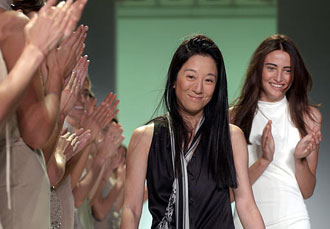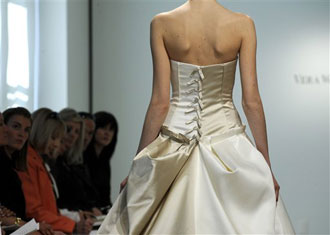|
GOLDSEA |
ASIAMS.NET |
ASIAN AMERICAN PERSONALITIES
THE 130 MOST INSPIRING ASIAN AMERICANS
OF ALL TIME
Vera Wang
PAGE 1 OF 3
 nce upon a time in a fashion-conscious village called Manhattan a poor little 40-year-old named Vera couldn't find the right wedding gown for her society-page first marriage. Being a certified fashion maven she took this as an affront to the universal order and a personal challenge. Vera's tycoon dad cut her a check for $4 million.
nce upon a time in a fashion-conscious village called Manhattan a poor little 40-year-old named Vera couldn't find the right wedding gown for her society-page first marriage. Being a certified fashion maven she took this as an affront to the universal order and a personal challenge. Vera's tycoon dad cut her a check for $4 million.
In the ensuing two decades Vera encountered enough money troubles, employee conflicts and other business crises to throw up her hands and retreat into the life of a pampered socialite. Instead she fretted, sweated and spouted printable witticisms to build her little wedding gown shop into a fashion brand that injected refreshing pastels and liberating sexuality into high-end wedding gowns. As Vera Wang approached the $100 million mark in the late 1990s she added everything from shoes to eyewear to linen to perfume which she calls "skin lingerie". In the process she has made her Chinese name synonymous with luxury, taste and status.
Vera Wang was born in New York around 1949. Her father Cheng Ching Wang was a businessman who had the advantage of descending from a family of high-ranking Chinese generals and government officials. Her fashion-conscious mother Florence Wu was the pampered daughter of a Chinese warlord. Together they gave Vera a privileged girlhood on the moneyed Upper East Side. When Vera was a little girl her father bought her a pair of skates and took her to Central Park to try them out. Vera fell in love with the sport and was soon taking private lessons at Madison Square Garden.
Given her parents' insistence on giving her the snootiest credentials Wang considers it "wild" that they allowed her to pursue figure skating. "It wasn't tennis or skiing or croquet or golf, things that were acceptable in those days," she says. "It was really a very blue-collar sport."
Once she began entering competitions and winning, Vera's life began to revolve around the sport. In the summers she skated as much as ten hours a day, and in the winters anywhere from two to six hours a day, as much as she could manage with school. Even so Wang's Olympic dreams died at the age of 18 when she failed to place in singles at the National Figure Skating Championships. The following year she returned to compete in pairs and came in fifth. At that time she was dating the French national champion, so she trained for one more year and did some exhibition skating. She quit soon after deciding that she couldn't live on the ice-show circuit.
"There's such a small window in which to make it," Wang says, "and you're judged so subjectively. I think that's a really hard price to pay when you work as hard as you have to as a skater. And it's very political. There are factions and cliques, and you're not judged, you know, on whether you got to the wall first or broke through the tape first. It's based on what people think. It's more open-minded now than it used to be, but there will always be that subjective side to skating, which makes it really just heartbreaking."
After finishing Chapin Vera attended Sarah Lawrence. She majored in theater since it was "just a hop and a skip away from ice skating." But she soon decided that an Asian woman in the early '70s was never going to make it as an actress. She switched her major to art history and spent one of her undergraduate years at the Sorbonne soaking up French fashion. That time kindled the love of fashion that would translate into her life's work though she didn't start thinking about making it her career until after graduation.
It wasn't her first career choice, but a love of fashion was always there, recalls Wang, ever since she started skating and had to pay close attention to costume. Later in life there were visits to couture houses with her mother who was "a complete clotheshorse". During her year in Paris while studying at the Sorbonne she had lived at her parents' apartment on the fashionable rue Spontini, steps from Yves Saint Laurent's salon. Then there were two summers working at the Yves Saint Laurent store in New York, first as a salesgirl and then as a window dresser. Attending design school seemed a natural next step.
Her father disagreed. Cheng Ching Wang had founded Singapore Petroleum and the Summit Company, a U.S.-based pharmaceutical trading and distribution company with offices throughout the Far East. He felt it was time his daughter got serious, like her younger brother Kenneth who was working for the family business. He encouraged Vera to pursue something practical like business or law. Vera was distraught.
"I had finished skating and finished college, and there was a very big void in my life," Wang recalls. "I really didn't want to go to law school or business school. And so my father said, 'Okay, if you think you're such a hotshot and you're talented in fashion, then get a job.'"
PAGE 2
1 |
2 |
3
Back To Main Page
|
|
|
|


Designer Vera Wang, center, is applauded by her models and the audience following the presentation of her spring-summer 2003 collection in New York Friday Sept. 20, 2002.
(AP Photo/Richard Drew)
|
|
“And so my father said, 'Okay, if you think you're such a hotshot and you're talented in fashion, then get a job.”
|

The Vera Wang Spring 2009 collection is modeled during Bridal Week, Thursday, April 17, 2008, in New York.
(AP Photo/Louis Lanzano)
|
CONTACT US
|
ADVERTISING INFO
© 1996-2013 Asian Media Group Inc
No part of the contents of this site may be reproduced without prior written permission.
|
